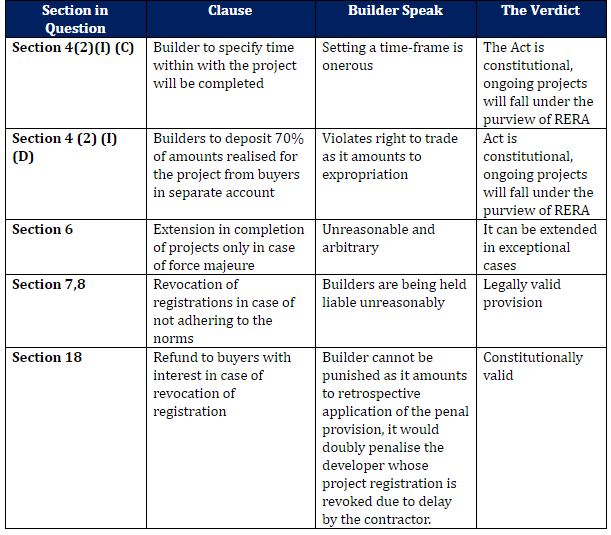The Bombay High Court upheld the constitutional validity of the Real Estate (Regulation and Development) Act (RERA) and its applicability to ongoing projects across states.
The year 2017 will be remembered as a golden year in the history of Indian real estate with the Real Estate (Regulation and Development) Bill coming into force.
RERA sought to protect the interests of a large number of aspiring homebuyers, while at the same time enhancing the credibility of the construction industry by promoting transparency, accountability, and efficiency in the execution of projects.
From its implementation in May, developers who have ongoing projects were given three months’ time to comply with the regulations and register their projects. But in July, builders moved the court in Nagpur and Mumbai challenging some of the provisions under RERA that required them to specify a timeframe for a project.
However, in its landmark judgement delivered on December 6, the High Court dismissed the developers’ petition to further safeguard homebuyers’ interest.
[bctt tweet=”The Bombay High Court upheld the constitutional validity of the Real Estate (Regulation and Development) Act (RERA) and its applicability to ongoing projects across states.” username=”RoofnFloor”]While the judgement came as a big relief for homebuyers, it did bring some cheer for developers as well.
Now, for exceptional cases, developers will get more time to complete their projects. However, this time will be granted based on in-depth analysis of each case.

While RERA is a central Act, the land is a subject of state. This is largely why the state governments were asked to frame the operational rules for RERA. This, in turn, became the major reason for dilution of rules by the states. While several clauses were diluted, the definition of ongoing projects became a major point of disconnect as several states altered the definition.
In addition, a few states excluded projects that had already received lease deed for 50-60% of the apartments or the project for which partial completion or occupancy certificates were obtained by the developer. It left buyers stuck with delayed ongoing projects with little hope.
But not anymore! Homebuyers in several states like Telangana, UP, Haryana, Maharashtra, Karnataka, Andhra Pradesh, and Madhya Pradesh can now challenge the rules that had been earlier diluted by the state governments to keep delayed and “ongoing projects” out of RERA’s ambit.
[button-blue url=”” target=”” position=””]“The Real Estate Act coming into force after a nine-year wait marks the beginning of a new era,” said housing and urban poverty alleviation (HUPA) minister M Venkaiah Naidu.[/button-blue]If considered in its true form, RERA is undoubtedly a balanced Act that holds great potential to transform the way real estate is done in India.
So, is this a dawn of a new era in the Indian real estate sector? Tell us your views in the comment section.


